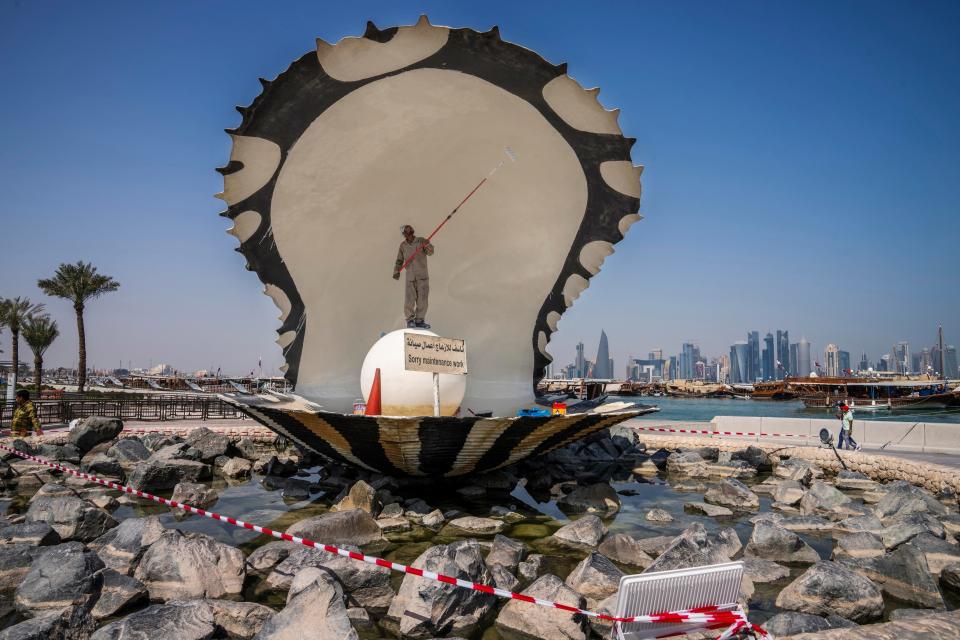We can't ignore the human rights issues plaguing the World Cup and its host country, Qatar
The significance of Qatar, an Arab, Muslim country, hosting the World Cup for the first time has been overshadowed by very serious, documented human rights violations and anti-LGBTQ laws that deserve to be talked about.
Some depictions and commentary about Qatar hosting such a grand sporting event — like a French newspaper's depiction of the Qatari national team as terrorists — have been, without a doubt, disgusting and racist. But calling concerns about migrant worker deaths a "publicity stunt" and other instances of whataboutism by Qatari and FIFA officials specifically in response to valid concerns of violations of international human rights law is unfortunate and unhelpful for everyone involved.
Human rights violations in Qatar
Ever since the Qatari government won its bid for the 2022 World Cup in Doha, there have been important allegations and documentation of ongoing human rights abuses in the country.
Taking a stand in Iran: Women’s rights and children’s rights are human rights
Most visible of those violations related to the World Cup, however, are the ones suffered by migrant workers. The Guardian has estimated that about 6,500 workers died while building the many infrastructure projects that had to quickly go up under the scorching sun of Qatari summers. That exact number has been impossible to pin down, however, in part because of the Qatari government's lack of willingness to adequately investigate the deaths of these men.
There have been recent legislative improvements for laborers in the country. A few years ago, government officials ended the visa sponsorship system commonly known as "kafala," which prohibited workers from changing jobs while under the original contract their visa was secured, and which led to instances of indentured servitude and other abuses against workers.

Whataboutism and FIFA's World Cup
There has been significant outspoken criticism about those who dare to bring up the documented human rights violations that have accompanied this year's World Cup.
FIFA's president, Gianni Infantino, responded to questions about human rights violations, migrant deaths and anti-LGBTQ laws in the country with a defiant display of whataboutism, arguing that, because Europe had been committing human rights abuses for centuries, European countries had no right to criticize human rights abuses in Qatar.
The emir of Qatar answered critics by claiming that his country has been "subjected to an unprecedented campaign that no host country has ever faced," as did journalists like Piers Morgan and others.
Forget thoughts and prayers: Colorado Springs shooting is what comes from anti-LGBTQ hate
Jumping to conclusions: After tragedies like Club Q shooting, let’s pause and mourn before demonizing one another
Infantino didn't make things any easier for himself and his Qatari hosts when he began the tournament with a weird, cringey monologue on Nov. 19 saying, "Today I feel Arab. Today I feel African. Today I feel gay. Today I feel disabled. Today I feel (like) a migrant worker."
After a reporter noted that he left out women, the FIFA president shot back, “I feel like a woman.”
How inclusive of him to feel so many things all at once.
Inclusivity was the theme of the event. There was lots of cloying talk about unity in a country where same-sex relationships are criminalized, where a Qatari event ambassador recently called same-sex relationships "damage in the mind" and where women must ask for permission from a male guardian to study abroad, travel, work or seek certain kinds of reproductive health care.

I'm not boycotting, but I'm not ignoring human rights problems
I am not saying that there aren't things to celebrate or enjoy at this year's World Cup. The Iranian players' silent protest, for instance, was a moving display of solidarity with demonstrators protesting human rights violations in their own country. The German team's posing for a photo with their hands covering their mouth, in protest of FIFA's prohibition on wearing a rainbow armband in support of LGBTQ rights, was another. Not to mention holding a World Cup in a Muslim country is an important issue of representation on the world sport stage.
I am also not saying Qatar is the only country in the world guilty of human rights violations that need to be rectified – I write about the United States' human rights abuses all the time. But just because other countries commit human rights violations doesn't mean we should ignore those being committed in Qatar, in the name of sport.
Opinion alerts: Get columns from your favorite columnists + expert analysis on top issues, delivered straight to your device through the USA TODAY app. Don't have the app? Download it for free from your app store.
Last, I am not boycotting the World Cup, but I also won't shy away from calling out human rights violations in my country or others, whether they are in preparation for war or a massive sporting event.
That's not how human rights should work.
Carli Pierson, a human rights attorney, is an opinion writer and a member of the USA TODAY Editorial Board. Follow her on Twitter: @CarliPiersonEsq
More from Carli Pierson:
You can't force love, but you can have a functional family: How to be a good stepparent
From my dating experience, this is how to dump Trump.
Dia de los Muertos taught me about preparing for death
You can read diverse opinions from our Board of Contributors and other writers on the Opinion front page, on Twitter @usatodayopinion and in our daily Opinion newsletter. To respond to a column, submit a comment to letters@usatoday.com.
This article originally appeared on USA TODAY: As US advances at World Cup, don't ignore Qatar's human rights issues

